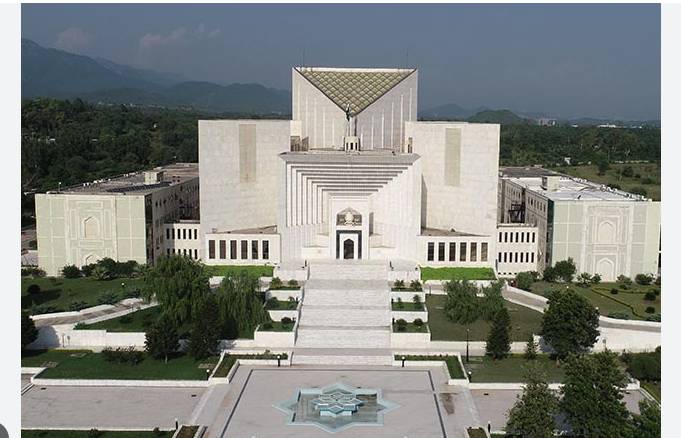SC constitutional bench adjourns civilians’ military trials case
Justice Mandokhail questions Army Act’s application to civilians; Judges examine violations of civilians' fundamental rights in military trials; Defence Ministry's lawyer says court does not have authority to nullify section of Army Act: Hearing to resume tomorrow

Stay tuned with 24 News HD Android App

The Supreme Court's constitutional bench has adjourned the hearing of the trial of civilians in military courts until tomorrow, reported 24NewsHD TV channel on Thursday.
The seven-member constitutional bench, headed by Justice Amin-ud-Din Khan, presided over the hearing. Advocate Khawaja Haris, representing the Ministry of Defence, continued presenting his arguments.
During the proceedings, Khawaja Haris argued that under certain circumstances, the Army Act also applies to civilians. In response, Justice Muhammad Ali Mazhar remarked that similar conclusions were drawn in the FB Ali and Sheikh Riaz Ali cases, where four judges had declared certain provisions of the Army Act void.
Khawaja Haris further stated that the court does not have the authority to annul provisions of the Army Act. Justice Jamal Mandokhail remarked that if this interpretation holds, even someone merely contemplating incitement could fall under the Army Act.
Justice Jamal Mandokhail questioned whether the Army Act has rendered Article 8, Section 1 of the Constitution ineffective and whether it could legally apply to civilians.
Justice Musarrat Hilali pointed out that copies of FIRs were not provided to individuals detained under military courts. She asked whether the accused are allowed legal representation during trials in military courts and whether all relevant evidence is shared with them. In response, Advocate Khawaja Haris confirmed that military courts provide both legal counsel and all necessary material to the accused.
Khawaja Haris added that judicial decisions on military courts are divided into two parts: one concerns the annulment of certain provisions of the Army Act, while the other addresses the custody of the accused under military courts. He argued that Article 10-A of the Constitution ensures the right to a fair trial, even in military court proceedings.
Justice Muhammad Ali Mazhar inquired whether a five-member bench had deemed sections of the Army Act inconsistent with Article 8 and what justification was provided for such a declaration in the decision.
Justice Jamal Mandokhail emphasised that the entire case regarding military courts revolves around Article 8. He questioned how someone who is not part of the armed forces could be subjected to its discipline.
Justice Jamal Mandokhail further stated, “A person serving in the Army is subject to military discipline. A person in the agriculture department is bound by its rules. How can someone unaffiliated with any institution fall under the jurisdiction of the Army's discipline? Bringing an unrelated individual under such discipline seems to violate Article 8 of the Constitution.”
Justice Mandokhail also noted that the constitutional bench could examine constitutional issues raised in intra-court appeals. He stated, “The highest position in Pakistan is that of the President. If the President’s House is attacked, the trial of the accused would take place in the Anti-Terrorism Court. However, if Army property is attacked, the trial would occur in a military court.”
In one instance, Justice Mandokhail asked the lawyer, “If a soldier murders his officer, where would the case be heard?” Khawaja Haris responded that such a murder case would be heard in an ordinary court. To this, Justice Mandokhail remarked, “How can a person who is not subject to the Army Act be deprived of their fundamental rights?”
Later, the constitutional bench adjourned the hearing on the military courts' case until tomorrow.
Reporter: Amanat Gishkori
